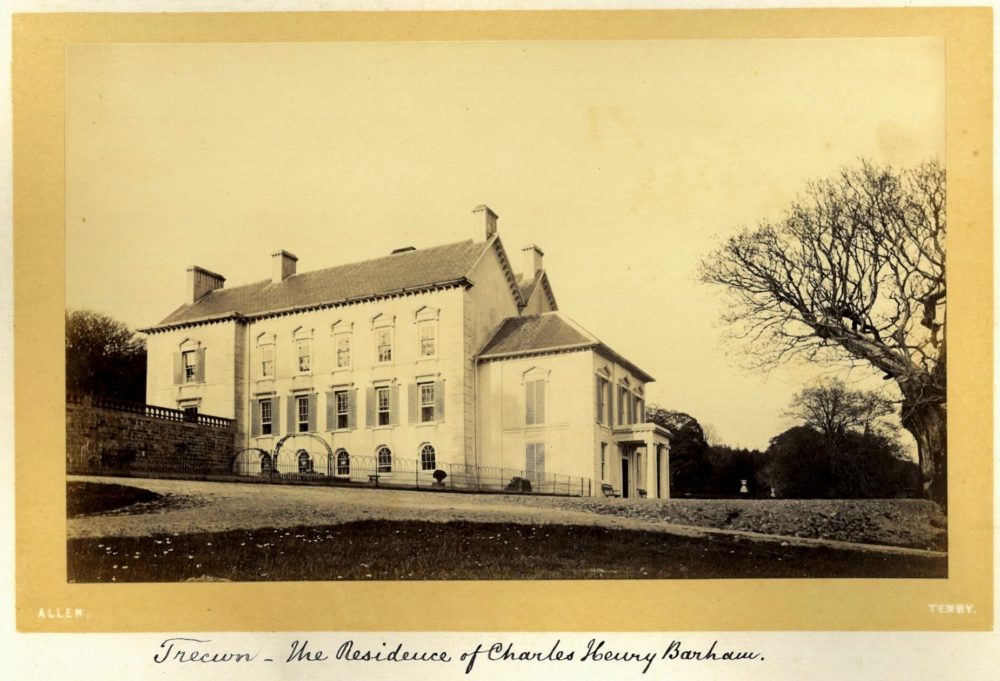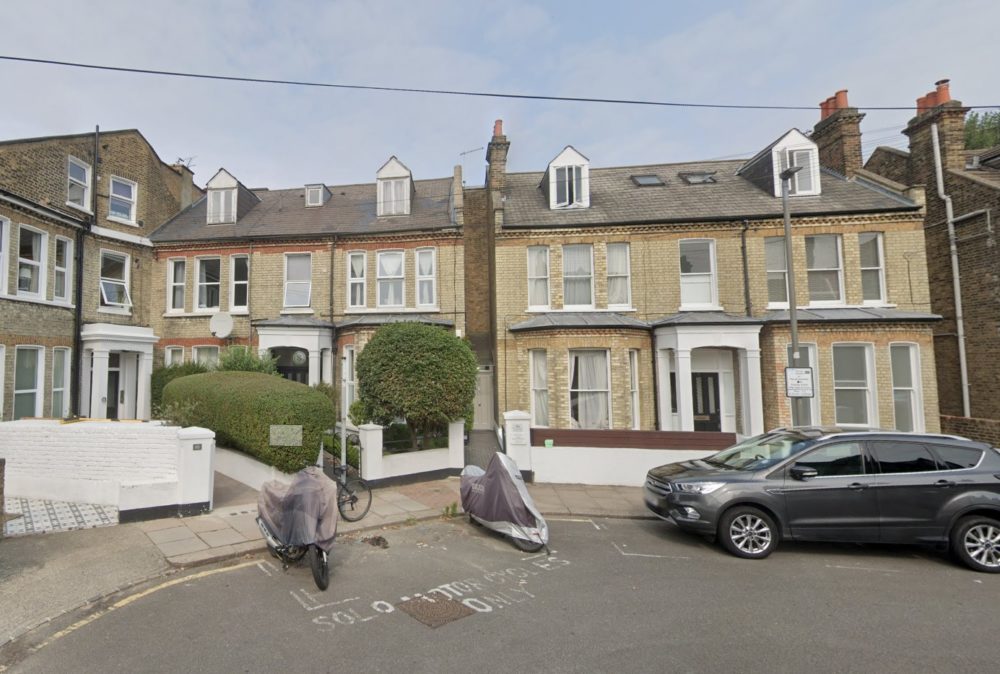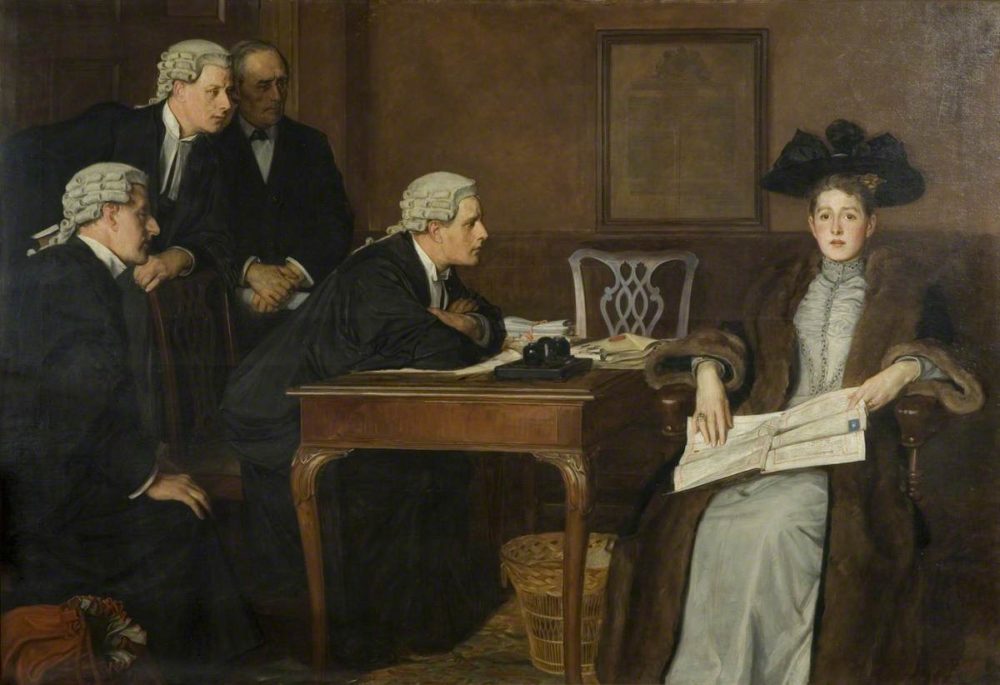House of Dogs, part 3: the first Robins v. Robins divorce trial, 1888

We continue our series exploring the history of a Pembrokeshire estate and its family.
Howell Harris
Francis’s first will, written in 1878 after the birth of the first three of his children to live, and probably after the death of his uncle Charles brought him a step nearer to his inheritance, suggests that at that date the Robinses were still a not excessively unhappy family.
He was generous with the wealth that he did not yet possess, leaving his property to his son and other heirs, with £1,000 a year to his widow (c. £550,000 today, relative to average earnings then and now).
In fact the Robinses’ marriage was increasingly troubled. The children had become weapons in the fight between the parents. Mary “trained” them “from their earliest days… to ignore and insult him and treat him with disrespect.” Cyril “used to make faces at his father and then slink away.”
This was just symptomatic of their larger problems. By 1885 Mary was already seeking a separation, which Francis only refused because he thought her proposed terms too stiff. They had several brief periods apart, and then in March 1887 she moved out of their house in Balham for good.

Infidelity
From Mary’s perspective, what was wrong with Francis as a husband? His drunkenness, violence, and repeated infidelity.
When she sued for a separation and eventually divorce, she had abundant evidence to bring before the court and witnesses aplenty to back her case.
Their marriage had not been lived out in the privacy of a nuclear family but in an upper-middle class household with cooks, chambermaids, governesses, tutors, and other members of a changing cast of servants observing and occasionally participating.
Francis, of course, disputed almost everything that she and they said, and had some supporting witnesses of his own. But as the trial judge determined that her testimony was more credible and the jury evidently agreed, I will rely on Mary’s accusations more than on Francis’s feeble and sometimes ludicrous attempts to refute or reverse them.
Boozing
The boozing was the hardest charge for him to deny, given that in 1880 he had been arrested in Kensington, drunk and presumably disorderly, at 11 o’clock one morning, released on bail, and subsequently taken before the magistrates and fined £2 (c. £1,200 relative to average earnings then and now) or a month in prison.
A former governess, Herminie Jumeau, also related a story about Francis returning home drunk on one occasion, coming into her room, and getting into her bed.
Francis’s explanation produced much understandable laughter: if he had got into her bed, he had known nothing of it, which was an admission of the drunkenness if not of the indecent act.
Madame Letallet, their Paris cook, also confirmed other evidence about his drinking habits.
Mary’s diary, produced in court, recorded him coming home in Nice at 9 one morning “in the usual state,” which Mr Justice Butt agreed meant “drunk” rather than Francis’s alternative reading, “tired,” after “making a night of it” with friends that ended with the drunken invasion and trashing of a Captain Forde’s room.
The upshot of that escapade had been that Francis had to leave town sharpish, ahead of the law, and Mary had to sell some of their possessions to raise the cash to follow him to Turin with the family.
Francis’s attempts at rebuttal only amounted to saying that, while he did of course drink, he was not a habitual drunkard. The judge did not believe him, and it is clear that this aspect of Francis’s conduct meant that Mary’s accusations about his resulting brutality became all the more credible. Butt’s experience had taught him that the connection between drunkenness and domestic violence was usually very close.
Violence
The violence cited in court was mostly a feature of the last few years of their marriage, after the young Parisienne Camille Henriette Bornier, b. 1862, joined their household as governess at £30 a year in 1883. But according to Mary it had begun shortly after his ejection from the Army and their enforced return to England a decade earlier. His worsening drinking only exacerbated the problem.
He treated her “with gross cruelty, striking her, turning her out of the house, and spitting in her face.” Witnesses testified that he used to beat her and the children “all round”; he was “in the habit of beating his son Cyril with a common dog whip.” Mary was “very distressed” by his unprovoked cruelty towards their offspring, in particular, “and cried very often.”
A servant from their Paris years reported having seen “her arms and shoulders quite black” with bruises. On one occasion he “locked his wife out of the house about two months before her confinement.
He had thrown things at her and beaten her on the chest with his fist. He had also pulled her hair and menaced her with a poker.”
Francis denied the final detail, arguing that “there were no pokers on the Continent”; one among several of his statements to provoke laughter in court.
But the violence was no laughing matter.
Another servant reported having seen Francis strike her with a belt, and on one occasion Mary “ran out on the [Clapham] common to escape his violence. She remained on the common for half an hour, and was crying bitterly when witness found her.”
Governess
He even beat the young governess Camille Bornier, with whom Mary alleged that he had been having an affair since Autumn 1883.
Though Camille’s testimony generally supported Francis’s denial of most of Mary and her witnesses’ accusations, her own letters to her parents tended to undermine it: she described the household as “enfer” (hell).
Physical violence was quite frequent but episodic. Verbal and emotional abuse, though, were constant. Francis subjected Mary to systematically degrading treatment (the spitting) and showered her with insults, belittling her in French and English and even sending her offensive postcards.
The judge took all of this as seriously as he did the physical violence even though English law did not yet recognise mental cruelty as grounds for divorce.
Her statement about this side of her ordeal bears repeating. Francis “habitually abused her and called her a whore a damned whore little fool idiot bitch, told her to go to hell and burn & frizzle and also frequently stated that she was a stinking mass of rottenness, he had taken her off the streets and wished she would return there with her damned children and rot there altogether.”
Brutality
Why did Mary not leave Francis sooner? She was afraid of but also dependent on him, and the physical brutality, at least, was not constant, though it did get worse over time.
“She frequently left him in consequence of his violence, but as she loved him she forgave him, and resumed cohabitation with him…. She was always anxious to cohabit with her husband if she possibly could, down to the last.”
There were also periods of reprieve. A woman who had nursed Mary observed that “After his fits of passion he would do almost anything for her.” Their older daughter Winifred, who was “really fond of him in spite of everything,” recalled that he could be “irresistibly charming at times.”
As late as 1886, after one of her escapes from home, Mary was still writing to him in the most loving terms. “‘You pet me more than I deserve… I want to roll myself up like a ball and get on your knee.’ (Laughter.)”
She called him “Bear” — the first of a number of alpha-male animal nicknames he would carry within the family, and whose disclosure in subsequent court cases would continue to amuse the public.
As the law then stood, Mary could secure a separation from Francis simply on grounds of his cruelty, but for a divorce she would also need proof of adultery. This she did her best to supply, but it was all pretty circumstantial — Francis kissing Camille in company; going into her bedroom half-dressed; she spending hours in his bedroom or even bathroom with nobody else there; the two of them having continued to share the same house after Mary’s final departure; him being a man of loose morals who had on a couple of occasions attempted to take liberties with a chambermaid who was subsequently delivered of an illegitimate child.
Most of this testimony was either flatly denied by Francis and Camille, or minimised and explained away — for example, she did go into his bedroom, but only to read to him from the New Testament.
Francis’s counter-suit against Mary only needed to prove her adultery in order to secure a divorce — the double standard was built into the 1857 Divorce Act — so his accompanying counter-accusation of her cruelty and violence towards him did not need to be accepted in order for him to succeed.
Injury
This was just as well, because some of the evidence he offered was unhelpful — particularly one instance where she flung a bronze statuette of a hare at him, doing real injury and leaving a piece of metal embedded in his scalp. Her account of the incident was that it was desperate self-defence, as he was attacking her with a pair of scissors at the time. Her version was credible because there was a witness to a similar attack by him on Camille herself that did result in wounding.
The other incidents he alleged — stabbing him with a steel pen, pulling out lumps of his beard, throwing an inkstand or tumbler of water at him, hitting him with one of the children’s steel leg-braces, even holding a knife on him — were of less significance, and not referred to in the judge’s summing-up. As for her alleged verbal abuse — calling him a drunkard, a madman, and a lunatic on a very regular basis (he said daily) since 1872 — it was simply fair comment.
But his adultery case against Mary rested on firmer foundations than hers had. He had far more resources to pile up evidence against her than she did on him, some of them perhaps provided by his most recent £1,000 mortgage. He employed private detectives to follow her trail and distributed photographs of her to stimulate witnesses’ recollections.
He even organised a sort of identity parade at his solicitor’s office where Mary had to promenade before the assembled witnesses, who were then asked to confirm that she was indeed the woman they had seen with a man not her husband.

Friendly relationsShe had, at the least, been very unwise in her close and friendly relations with an American electrician, Charles Stuart Cochrane, whom Francis had met at the races in Goodwood and then at a Moody and Sankey revival and invited, once, to their home in Balham.
Mary called him her “American cousin” but Francis, who disapproved of Cochrane and barred him from their house after that visit, ended up citing him as her co-respondent.
Francis alleged that they had spent a lot of time together in the autumn of 1885, in hotels around South London where they both lived and on a trip down to Bath, Wells, Clevedon, and Bristol while he, Camille, and the children had been at Hastings.
He produced a stream of “livery stable keepers, labourers, ostlers, and railway porters” that, Mr Justice Butt complained, he thought “would never come to an end,” to document their liaison.
The one witness he could not produce was Cochrane himself, though Charles had written to Francis to tell him that his testimony would be helpful.
But Cochrane was, as Mr Justice Butt made clear, “a bad man.”
Engaged
At the same time that he was spending time with Mary he was also engaged in an affair with a Mrs Caroline Fanshawe. This resulted in her divorce from Major Edward Cardwell Fanshawe, R.E. — coincidentally, cousin to the Secretary of State for War who had rubber-stamped the end of Francis’s military career — with Cochrane cited as co-respondent, Cochrane’s divorce by his wife Laetitia, and his arrest and trial on a charge of fraud.
Caroline was his accomplice in an attempt to sell valuable shares (£1,160, worth c. £670,000 today) of Laetitia’s by impersonating his wife’s trustees and forging their signatures. But he alone was convicted and sentenced to eighteen months’ hard labour, which he took badly.
The testimony that he might have given against Mary was therefore tainted by his own bad character. It was also fatally undermined by the fact that he had shot himself in the head and chest, been tried before a magistrate on a charge of attempted suicide, fled the country, and died back home in the United States a couple of weeks before the Robinses’ trial opened.
Without his star witness, and after a critical summary from an unimpressed judge of the copious evidence that he had offered, it was unsurprising that Francis was as unsuccessful in persuading the jury that Mary had been unfaithful as she was in convicting him. Mr Justice Butt did his best to help her by concluding that some of Francis and Camille’s testimony was obviously lies and that they had given themselves plenty of opportunities for adultery. But neither case satisfied the rigorous standards of proof required.
Winner
The winner was therefore Mary, who got her separation on grounds of Francis’s cruelty while his counter-accusation was rejected; custody of the children; and £250 a year in alimony, rather than the £140 he had been allowing her since she left, with him having custody and her only limited access. To twist the knife in the wound, he had to pay Mary’s considerable costs as well as his own. The one surviving costs order, for her further costs at the end of the trial, amounted to £150.
Mr Justice Butt also drove the final nail into the coffin containing Francis’s reputation. He drew the connection between Francis’s behaviour as a husband and a drunkard, and the disastrous end of his military career. “Was a man who so conducted himself fit to be in the British Army?” The judge obviously agreed with the military authorities that the answer was a resounding No.
In the next episode we will explore how Francis and Mary spent their years apart between 1888 and 1895, and their second meeting in the Divorce Court, when he sued again to terminate their marriage on the grounds of her repeated adultery.
You can read the first and second episodes here.
Support our Nation today
For the price of a cup of coffee a month you can help us create an independent, not-for-profit, national news service for the people of Wales, by the people of Wales.





